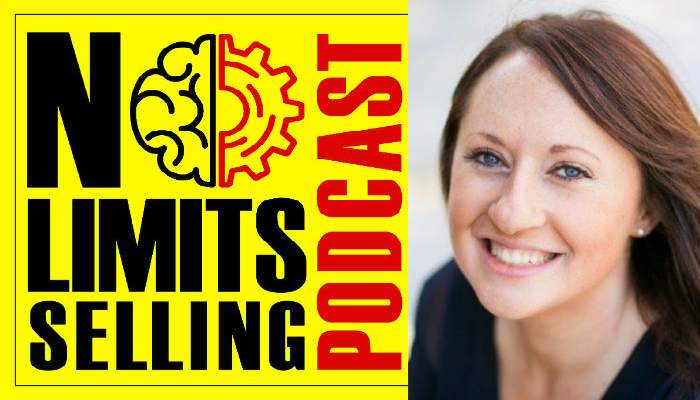Colleen Rippey Publisher of Baltimore Real Producers
On Episode 83 of The No Limits Selling Podcast, we have Colleen Rippey, Owner, and CEO at Coastal Real Producers and Baltimore Real Producers. Colleen started her professional career as a sophomore in college while earning her Bachelor’s in marketing. She was recruited by Vector Marketing, a subsidiary of the Cutco Corporation. Very quickly, Colleen realized she had an important skill- she could sell. Colleen was able to travel through earned incentive trips, hone her sales skills, and earn six figures while selling Cutco knives to consumers for 5 years.
In 2013, she made a shift in her business and started to focus on selling Cutco to Realtors as closing gifts. She then achieved Hall of Fame status and sold over $2 million of Cutco, making her one of the best in Cutco history.
As she spent her time with Realtors and affiliates alike, she started to realize there wasn’t a platform that brought the real estate community together across brokerage lines.
In 2017, Baltimore Real Producers was launched. BRP is a platform that curates connections and collaborations between the top-producing Realtors and affiliates in central Maryland. This is accomplished primarily via telling stories in our monthly print & digital magazine, hosting regular events, and a private Facebook community.
This year, Baltimore Real Producers received the “Best Content Award”. BRP is Woman and Queer owned.
Currently, Colleen lives in Baltimore City with her wife Jilleien (and Editor-in-Chief of Baltimore Real Producers magazine) with their spoiled puppy Petey. Most of their spare time is spent running their nonprofit Love and Lunches, which serves to feed the homeless and hungry in Baltimore City every week.

Contact Colleen:
- @colleenrippey for IG/FB/Tiktok
- @baltimorerealproducers
[EDITOR’S NOTE: This podcast is sponsored by No Limits Selling. It is a fun, fast-paced podcast that delivers hard-fought business advice that you can implement today to improve your sales and performance]
Interested In Our Real Estate Coaching Services? Explore Our Website: Link
Feeling Not Well Today? You Can Use Our Mindset Boosters App To amp Up Your Mood: Link
Find us on Social Media:
LinkedIn | Facebook community | Instagram
Like what do you listen to? Subscribe to our podcast!
Ready to become fearless? We can help you become fearless in 60 days so you accomplish more in your career Schedule A 15 min Call with UmarSummary
Introduction
The podcast begins with an introduction of Colleen Rippey, who is the owner and CEO of Coastal Real Producers and Baltimore Real Producers. Colleen shares her journey into the real estate industry and how she has grown her business over the years.
Colleen's Journey into Real Estate
Colleen Rippey started her career in the real estate industry as a realtor. She shares her experiences and challenges she faced in the early stages of her career. Colleen's passion for real estate and her determination to succeed helped her overcome these challenges.
Establishment of Coastal Real Producers and Baltimore Real Producers
Colleen talks about the establishment of Coastal Real Producers and Baltimore Real Producers. She explains how she identified a gap in the market and decided to start her own business. Colleen shares the struggles she faced in setting up her business and how she overcame them.
Success Factors
Colleen attributes her success to her strong work ethic, her ability to build and maintain relationships, and her commitment to providing excellent service to her clients. She also emphasizes the importance of continuous learning and adapting to changes in the real estate industry.
Advice for Aspiring Real Estate Professionals
Colleen offers advice to aspiring real estate professionals. She encourages them to be persistent, to build strong relationships, and to always put their clients' needs first. Colleen also advises them to continuously learn and adapt to changes in the industry.
Conclusion
In conclusion, the podcast provides an insightful look into the journey of Colleen Rippey, a successful entrepreneur in the real estate industry. Starting as a realtor, Colleen faced numerous challenges but her passion and determination led her to establish her own businesses, Coastal Real Producers and Baltimore Real Producers. Her success is attributed to her strong work ethic, relationship-building skills, and commitment to client service. Colleen's advice to aspiring real estate professionals emphasizes persistence, relationship building, and continuous learning.
As she looks to the future, Colleen expresses optimism for the real estate industry and reaffirms her commitment to excellence in service delivery for her clients.
Questions & Answers
Who is Colleen Rippey?
What are Coastal Real Producers and Baltimore Real Producers?
What is Colleen Rippey's philosophy in business?
What advice does Colleen Rippey offer to aspiring real estate professionals?
What are Colleen Rippey's future plans for Coastal Real Producers and Baltimore Real Producers?
Don’t miss this opportunity to transform your real estate career with one-on-one coaching. As an experienced real estate coach, I, Umar Hameed, am dedicated to helping you unlock your full potential and achieve your real estate goals. To learn more about who am I and my clients ↓
If you’re ready to take the next step, book an appointment with me today and begin your journey toward success in the real estate industry.
